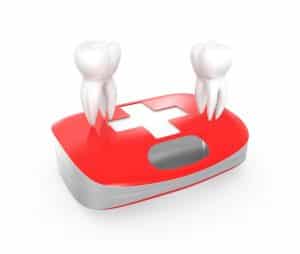 Yay! You think to yourself. I’m so in love with the idea of receiving dental implants! Then, just as quickly as you felt on top of the world, you may have noticed that you pulled your head out of the clouds and your dreams came crashing down around you. Wait a second … will they be difficult to protect? If this is the concern that followed your initial excitement, rest assured, you’re not the only patient to feel such highs and lows in researching implants. Fortunately, you will soon learn that keeping implants safe is very easy.
Yay! You think to yourself. I’m so in love with the idea of receiving dental implants! Then, just as quickly as you felt on top of the world, you may have noticed that you pulled your head out of the clouds and your dreams came crashing down around you. Wait a second … will they be difficult to protect? If this is the concern that followed your initial excitement, rest assured, you’re not the only patient to feel such highs and lows in researching implants. Fortunately, you will soon learn that keeping implants safe is very easy.
A White Smile For A Spring Wedding
 Spring is quickly approaching and you may be realizing that wedding season is on its way, too. Are you going to be a bride? A groom? A bridesmaid? A guest? Whatever the case, when you’re headed out to such a happy, love-filled event, the last thing you want to worry about is whether your smile is going to look okay in person (and in pictures). When teeth whitening is necessary, you may also find yourself worrying about whether there’s still time to brighten up that grin. Good news: There is!
Spring is quickly approaching and you may be realizing that wedding season is on its way, too. Are you going to be a bride? A groom? A bridesmaid? A guest? Whatever the case, when you’re headed out to such a happy, love-filled event, the last thing you want to worry about is whether your smile is going to look okay in person (and in pictures). When teeth whitening is necessary, you may also find yourself worrying about whether there’s still time to brighten up that grin. Good news: There is!
Time To Talk Toothpaste
 When’s the last time you sat around figuring out whether you were using the best toothpaste for your oral health? Perhaps a friend recently mentioned that she avoids fluoride in her toothpaste, which left you feeling quite shocked. Really, you may have thought to yourself, but I thought fluoride was a good thing?! To help clear up any confusion regarding how to choose well for your dental hygiene, we’ve got the details all laid out for you. It’s actually surprisingly easy to make the right selection.
When’s the last time you sat around figuring out whether you were using the best toothpaste for your oral health? Perhaps a friend recently mentioned that she avoids fluoride in her toothpaste, which left you feeling quite shocked. Really, you may have thought to yourself, but I thought fluoride was a good thing?! To help clear up any confusion regarding how to choose well for your dental hygiene, we’ve got the details all laid out for you. It’s actually surprisingly easy to make the right selection.
Q&A: Dental Sealants For My Child
 You want to do all that you can to help your child avoid cavities. With that in mind, if we told you that dental sealants offer exceptional protection for hard-to-reach teeth (and areas that tend to trap bacteria), what would you think about that? If you know anything about sealants, you likely already know that this is exactly what they do and you probably feel pretty excited about them. What you might not feel as excited about, however, is that you feel like you still need more information before you’re ready to set up an appointment. Not a problem! Our Q&A session will fix that right up.
You want to do all that you can to help your child avoid cavities. With that in mind, if we told you that dental sealants offer exceptional protection for hard-to-reach teeth (and areas that tend to trap bacteria), what would you think about that? If you know anything about sealants, you likely already know that this is exactly what they do and you probably feel pretty excited about them. What you might not feel as excited about, however, is that you feel like you still need more information before you’re ready to set up an appointment. Not a problem! Our Q&A session will fix that right up.
Protect Your Smile During Cold And Flu Season
 You might remember from previous experiences with finding yourself under the weather that caring for your oral health usually falls down a few notches on your list of priorities. Instead, you feel comfortable remaining in bed and skipping dental hygiene, you stay hydrated with whatever tastes the best, and you just try to feel better again! While we know it’s tough to keep your teeth and gums as your number one concern when the cold or flu hits, we have some suggestions for doing your absolute best.
You might remember from previous experiences with finding yourself under the weather that caring for your oral health usually falls down a few notches on your list of priorities. Instead, you feel comfortable remaining in bed and skipping dental hygiene, you stay hydrated with whatever tastes the best, and you just try to feel better again! While we know it’s tough to keep your teeth and gums as your number one concern when the cold or flu hits, we have some suggestions for doing your absolute best.
Veneers: How Does It All Work?
 You might have some amazing things to say about porcelain veneers once you learn a bit about them. You have every right, of course, to feel this way! They can cover up a multitude of unsightly problems, while leaving you with a natural looking (much improved) smile. However, when asked about the process, you might find yourself falling silent. Yes, you know about their benefits but do you know what it’s like to receive them? If you’ve been feeling curious about this lately, let us fill you in.
You might have some amazing things to say about porcelain veneers once you learn a bit about them. You have every right, of course, to feel this way! They can cover up a multitude of unsightly problems, while leaving you with a natural looking (much improved) smile. However, when asked about the process, you might find yourself falling silent. Yes, you know about their benefits but do you know what it’s like to receive them? If you’ve been feeling curious about this lately, let us fill you in.
3 Reasons To Drink Some Tap Water
 Do you generally drink tap water? Or, do you find that you shy away from it because you assume it’s “not as good as” other water options, such as the packaged selections you can find in your local grocery store? If you’ve been giving this option for your hydration a bad wrap, we encourage you to consider some reasons to go ahead and pour yourself a nice tall glass (or to fill up a reusable bottle). It’s actually a good idea for your oral health!
Do you generally drink tap water? Or, do you find that you shy away from it because you assume it’s “not as good as” other water options, such as the packaged selections you can find in your local grocery store? If you’ve been giving this option for your hydration a bad wrap, we encourage you to consider some reasons to go ahead and pour yourself a nice tall glass (or to fill up a reusable bottle). It’s actually a good idea for your oral health!
Dry Mouth: It Could Happen To You
 You might hear the term dry mouth and immediately pass it off as something that’s a side effect of those medications in television ads. What you might not realize is that 1. You might be taking a medicine that causes this issue as a side effect. Also, 2. Anyone can end up with this usually temporary problem that is treatable, that you might be able to address at home, and that can lead to some serious complications if you ignore it! Let’s help you get to know the details, so you’re ready if you end up with parched tissues.
You might hear the term dry mouth and immediately pass it off as something that’s a side effect of those medications in television ads. What you might not realize is that 1. You might be taking a medicine that causes this issue as a side effect. Also, 2. Anyone can end up with this usually temporary problem that is treatable, that you might be able to address at home, and that can lead to some serious complications if you ignore it! Let’s help you get to know the details, so you’re ready if you end up with parched tissues.
Ready For A Dental Emergency?
 Regardless of the type of dental emergency that happens to you, there’s an easy way to get yourself prepared. Hopefully, of course, this is not something you will ever need to deal with. However, if you find yourself with a broken tooth, severe pain, or otherwise, it’s always wise to have a plan on hand, so you don’t waste any time trying to figure out what to do. Consider helpful recommendations and you will be ready to snap into action if the moment ever calls for it.
Regardless of the type of dental emergency that happens to you, there’s an easy way to get yourself prepared. Hopefully, of course, this is not something you will ever need to deal with. However, if you find yourself with a broken tooth, severe pain, or otherwise, it’s always wise to have a plan on hand, so you don’t waste any time trying to figure out what to do. Consider helpful recommendations and you will be ready to snap into action if the moment ever calls for it.
Your Snoring Quiz: Do You Know What It Is?
 Is there something frustrating to you about dealing with snoring without understanding why it’s happening, what you can do about it, and whether it’s a serious problem or just a minor annoyance? We understand! What you might not realize is that we see patients all the time who are dealing with the same sort of challenge. To help you make sense of this sleep interruption, we encourage you to take a quick quiz and to get in contact with us if you think you’re ready for treatment.
Is there something frustrating to you about dealing with snoring without understanding why it’s happening, what you can do about it, and whether it’s a serious problem or just a minor annoyance? We understand! What you might not realize is that we see patients all the time who are dealing with the same sort of challenge. To help you make sense of this sleep interruption, we encourage you to take a quick quiz and to get in contact with us if you think you’re ready for treatment.







